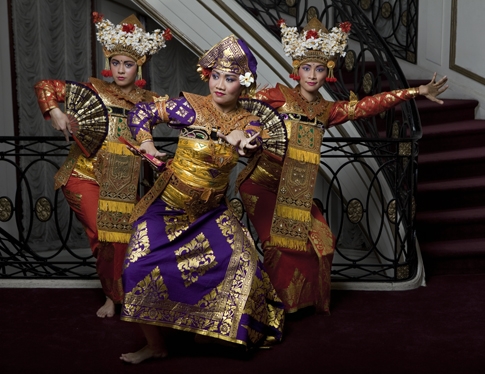Thursday, Dec 17, 2009
Internationally renowned performers of Asian music will present five free concerts on the Westminster Choir College campus in Princeton in spring 2010. The concerts will include both traditional and contemporary music from Japan, China, Korea and Indonesia. The series, which is organized by Eric Hung, associate professor of Music History, and Mi-Hye Chyun, Talbott Library chair, is coordinated with an East Asian music seminar Hung is teaching in the spring semester.
“The class and the concerts are designed to showcase the great variety of music that is played in East and Southeast Asia,” said Hung. “Many people think that all East Asian music has lots of cymbals and is based on five-note scales. There is certainly some East Asian music that sounds like the recordings you hear at Chinese buffets, but there is a lot more music that sounds nothing like that. I hope this series will introduce the great variety of East Asian music to our community.”
All performances are on Monday evenings at 7:30 p.m. in either Bristol Chapel or the Playhouse on the Westminster campus. Check the Rider Web site for details at www.rider.edu/arts.
The Asian Music Mondays series begins on February 1 with Masayo Ishigure, a virtuoso on both the koto, a 13-string zither, and shamisen, a Japanese lute. She studied at the Sawai Academy of Music, an institute that aims to broaden the repertory for traditional Japanese instruments by performing contemporary music, playing non-Japanese music on the koto, and incorporating Japanese instruments in Western instrumental ensembles.
Since her arrival in New York City in 1992, Ishigure has performed at numerous prestigious venues in the United States, including Lincoln Center, Brooklyn Academy of Music, and at Harvard, Yale and Columbia universities. She has also made numerous tours of Europe, and performed in Thailand, Brazil, Mexico and Jamaica. In 2005, Ishigure collaborated with Itzhak Perlman, Yo-Yo Ma and others on the John Williams’ soundtrack for the movie Memoirs of a Geisha. Ishigure’s recital at Westminster will include both traditional and contemporary works for koto and shamisen.
On February 15, Music from China, a Chinese chamber music ensemble led by Susan Cheng and Wang Guowei, will perform. Founded in 1984, this ensemble has given numerous concerts throughout the United States, including at Lincoln Center, Carnegie Hall, the Library of Congress, and the Freer Gallery of Art of the Smithsonian Museum, where they were joined by cellist Yo-Yo Ma. Very active in commissioning and performing new music for Chinese instruments, Music from China has won the Adventurous Programming award from Chamber Music America and ASCAP. At their Westminster concert, Music from China will be joined by the Music from China Youth Orchestra, a 30-piece ensemble of musicians, ages 8 to 18, who perform on traditional Chinese instruments.
On February 22, Sebastian Wang, director of the University of Maryland Korean Music Ensemble and a former student of Kim Duk Soo, the most famous samulnori performer in the world, will bring the combined forces of Washington and New York samulnori to Westminster. Samulnori, which literally means the “playing of four things.” involves contemporary renditions of traditional Korean percussion music. It uses four instruments: the changgo, an hourglass-shaped drum; the buk, a barrel drum; the jing , a large gong; and the kkwaenggwari, a small gong. Samulnori traces its roots to traditional farmers’ band music as well as shaman music.
On March 8, Wu Fei, a composer and virtuoso of the Chinese guzheng, a 21-string zither, will perform. Wu began giving solo concerts at the age of 9, and she entered the China Conservatory of Music at the age of 15. Today she performs regularly in China, the United States, Italy, Germany and Norway, and she has collaborated with a diverse collection of greats including John Zorn, Bela Fleck, Pauline Oliveros, Carla Kihlstedt and Cecil Taylor. Her Westminster recital will feature new music for guzheng and voice.
The final concert in this series, on March 22, will feature New York-based Gamelan Dharma Swara, led by Balinese directors I Nyoman Saptanyana and Ida Ayu Ari Candrawati. The group will perform traditional instrumental and dance works as well as new compositions for Balinese gamelan ensemble. The ensemble was recently invited by Madé Mankgku Pastika, governor of Bali, to perform at the 2010 Bali Arts Festival beside other Balinese groups in the 8,000-seat Ardha Chandra arena. This marks the first time a non-Balinese group has been asked to perform in this format.
Leading up to their performance at the Bali Arts Festival, the ensemble will also conduct a “mini-tour” of the island, performing in the traditional meeting houses (banjar) of several villages, including Ubud, Jagaraga, Tenganan, Kerambitan and Mengwitan. In recent seasons, Gamelan Dharma Swara has performed at Avery Fisher Hall, Symphony Space, Asia and Japan Societies, Princeton and Yale Universities, the Brooklyn Museum, and the American Museum of Natural History. It has also released two DVDs: Ramayana Bali (Arts Indonesia) and Bhima Swarga (Tzadik).

